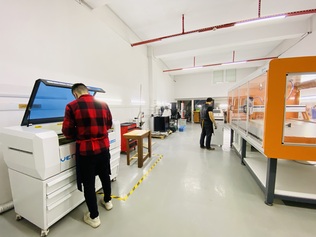The piece of text below is a shortened, hashed representation of this content. It is useful to ensure the content has not been tampered with, as a single modification would result in a totally different value.
Value:
0f661fc7f1c9956390a2110cd30e7f965eb6e8889cffd7ab8282de8b9b9b1f4a
Source:
{"body":{"en":"<p>Through our practice, we got mainly four points highlighted as lessons learned. First, as most of the stories we built around community life topics, it can be deduced that participants look for a sharing-oriented city life. Second, participants have knowledge and training demands about producing from waste, which shows that there can be high interest in these topics in the maker space. Third, younger generations want to get involved in dynamic activities which also involve older people and their life experiences. Finally, as it can be understood from the activities , since the citizens have just learned the term \"maker\", it is needed to support awareness and knowledge about this field so that citizens can be more involved.</p><div class=\"editor-content-image\" data-image=\"\"><img src=\"https://lh7-us.googleusercontent.com/TfvwGr0Xcd1f8fIW07uVBU-f_4T_1w3CKMAalEWRWu11Iv5xff04ejynPY0RuxxTjITDKtHwKHw4gUebN4Z7RBoJvO9L9tigPFa6jDOX0CZd1SzHRI8oMaFUnkQdHBYdI9sx55eJAcZHz1-kdcrRi04\" width=\"602\" alt=\"\"></div><p>At the same time, we have reached almost 50.000 people through the upcycling activities we carried out in this maker space. Also with this practice, we have provided support for the dissemination of zero waste practices and the implementation of the circular economy transition process in cities with a participatory management approach by informing the citizens.</p><ul><li><p>Common maker spaces operated by local or central governments can have noticeable support for the entrepreneurial ecosystem and contribute significantly to the circular economy transition process in cities.</p></li><li><p>Expanding common maker space is very important for the development of the entrepreneurial ecosystem in cities.</p></li><li><p>In the commercialization processes of startups, local governments have a very important role in providing user experience and support in terms of dissemination.</p></li><li><p>It is very important to include all representative groups in cities in implementation practices in terms of fair management and inclusiveness.</p></li></ul><p><br></p><ul><li><p><a href=\"https://cevre.ibb.istanbul/atik-yonetimi-mudurlugu-sube-mudurlugu/dongusel-isler-atolyesi/\" rel=\"noopener noreferrer\" target=\"_blank\">https://cevre.ibb.istanbul/atik-yonetimi-mudurlugu-sube-mudurlugu/dongusel-isler-atolyesi/</a> </p></li></ul><p> </p>","es":"<p>A través de nuestra práctica, obtuvimos principalmente cuatro puntos destacados como lecciones aprendidas. En primer lugar, como la mayoría de las historias que construimos giraban en torno a temas de la vida comunitaria, se puede deducir que los participantes buscan una vida en la ciudad orientada a compartir. En segundo lugar, los participantes tienen demandas de conocimiento y formación sobre la producción a partir de residuos, lo que demuestra que puede haber un gran interés por estos temas en el espacio maker. En tercer lugar, las generaciones más jóvenes quieren participar en actividades dinámicas en las que también participen personas mayores y sus experiencias vitales. Por último, como se desprende de las actividades, dado que los ciudadanos acaban de conocer el término “maker”, es necesario apoyar la sensibilización y el conocimiento sobre este campo para que los ciudadanos puedan implicarse más.</p><div class=\"editor-content-image\" data-image=\"\"><img src=\"https://lh7-us.googleusercontent.com/TfvwGr0Xcd1f8fIW07uVBU-f_4T_1w3CKMAalEWRWu11Iv5xff04ejynPY0RuxxTjITDKtHwKHw4gUebN4Z7RBoJvO9L9tigPFa6jDOX0CZd1SzHRI8oMaFUnkQdHBYdI9sx55eJAcZHz1-kdcrRi04\" width=\"602\" alt=\"\"></div><p>Al mismo tiempo, hemos llegado a casi 50.000 personas a través de las actividades de reciclaje También con esta práctica, hemos prestado apoyo a la difusión de prácticas de residuo cero y a la aplicación del proceso de transición a la economía circular en las ciudades con un enfoque de gestión participativa mediante la información a los ciudadanos.</p><ul><li><p>Los espacios de producción comunes gestionados por los gobiernos locales o centrales pueden tener un apoyo notable para el ecosistema emprendedor y contribuir significativamente al proceso de transición a la economía circular en las ciudades.</p></li><li><p>La ampliación de los espacios de producción comunes es muy importante para el desarrollo del ecosistema empresarial en las ciudades.</p></li><li><p>En los procesos de comercialización de las startups, los gobiernos locales tienen un papel muy importante a la hora de proporcionar experiencia de usuario y apoyo en términos de difusión.</p></li><li><p>Es muy importante incluir a todos los grupos representativos de las ciudades en las prácticas de implementación en términos de gestión justa e inclusiva.</p></li></ul><p><br></p><ul><li><p><a href=\"https://cevre.ibb.istanbul/atik-yonetimi-mudurlugu-sube-mudurlugu/dongusel-isler-atolyesi/\" rel=\"noopener noreferrer\" target=\"_blank\">https://cevre.ibb.istanbul/atik-yonetimi-mudurlugu-sube-mudurlugu/dongusel-isler-atolyesi/</a> </p></li></ul><p> </p><p> </p>","fr":"<p>Notre pratique nous a permis de tirer quatre leçons. Tout d'abord, comme la plupart des histoires que nous avons construites portent sur des sujets liés à la vie communautaire, on peut en déduire que les participants recherchent une vie urbaine axée sur le partage. Deuxièmement, les participants ont des demandes de connaissances et de formation sur la production à partir de déchets, ce qui montre qu'il peut y avoir un grand intérêt pour ces sujets dans l'espace maker. Troisièmement, les jeunes générations veulent s'impliquer dans des activités dynamiques qui impliquent également les personnes âgées et leurs expériences de vie. Enfin, comme on peut le comprendre à partir des activités, puisque les citoyens viennent juste d'apprendre le terme « maker », il est nécessaire de soutenir la sensibilisation et la connaissance de ce domaine afin que les citoyens puissent s'impliquer davantage.</p><div class=\"editor-content-image\" data-image=\"\"><img src=\"https://lh7-us.googleusercontent.com/TfvwGr0Xcd1f8fIW07uVBU-f_4T_1w3CKMAalEWRWu11Iv5xff04ejynPY0RuxxTjITDKtHwKHw4gUebN4Z7RBoJvO9L9tigPFa6jDOX0CZd1SzHRI8oMaFUnkQdHBYdI9sx55eJAcZHz1-kdcrRi04\" width=\"602\" alt=\"\"></div><p>Dans le même temps, nous avons touché près de 50 000 personnes grâce aux activités de recyclage que nous avons menées dans cet espace de création. Cette pratique nous a également permis de soutenir la diffusion des pratiques zéro déchet et la mise en œuvre du processus de transition vers l'économie circulaire dans les villes avec une approche de gestion participative en informant les citoyens.</p><ul><li><p>Les espaces de production communs gérés par les gouvernements locaux ou centraux peuvent apporter un soutien notable à l'écosystème entrepreneurial et contribuer de manière significative au processus de transition vers l'économie circulaire dans les villes.</p></li><li><p>L'expansion des espaces de production communs est très importante pour le développement de l'écosystème entrepreneurial dans les villes.</p></li><li><p>Dans les processus de commercialisation des startups, les gouvernements locaux ont un rôle très important à jouer en fournissant une expérience utilisateur et un soutien en termes de diffusion.</p></li><li><p>Il est très important d'inclure tous les groupes représentatifs des villes dans les pratiques de mise en œuvre en termes de gestion équitable et d'inclusion.</p></li></ul><p><br></p><ul><li><p><a href=\"https://cevre.ibb.istanbul/atik-yonetimi-mudurlugu-sube-mudurlugu/dongusel-isler-atolyesi/\" rel=\"noopener noreferrer\" target=\"_blank\">https://cevre.ibb.istanbul/atik-yonetimi-mudurlugu-sube-mudurlugu/dongusel-isler-atolyesi/</a> </p></li></ul><p> </p>"},"title":{"en":"Istanbul: Circular Makerspace For Waste to Good ","es":"Estambul: Espacio circular de creación para convertir residuos en bienes","fr":"Istanbul : Espace de création circulaire pour la transformation des déchets en produits de qualité "}}
This fingerprint is calculated using a SHA256 hashing algorithm. In order to replicate it yourself, you can use an MD5 calculator online and copy-paste the source data.




Share
Or copy link